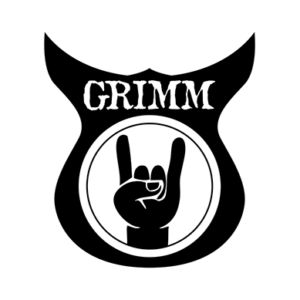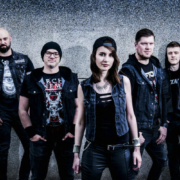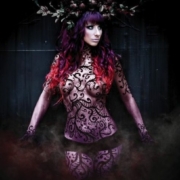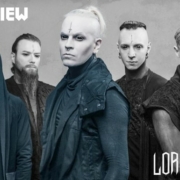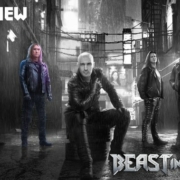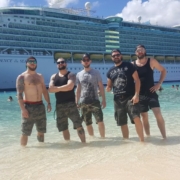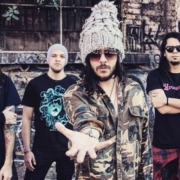Unleash the Archers are rising stars in the realm of melodic metal. The Canadian quintet released a couple of decent albums in the early years of their existence, but it wasn’t until 2017 that they really started to impress us. Their latest record “Apex” takes the music to a whole new level. Each song on the album is a masterful blend of traditional and power metal, played with technical skill and modernist verve. What really puts them over the top are the versatile vocals of Brittney Slayes. Boasting a great range and an unmatched degree of power and control, she definitely ranks among the most talented vocalists of the current scene. In addition to her singing prowess, she also makes sure her lyrics tell an enticing story. Here at GRIMM Gent, we salute this effort to turn heavy metal into a comprehensive musical experience that moves listeners in every conceivable way. So it was with great pleasure that we sat down with Brittney to tackle questions of education and experience, emancipation and the ultimate point of skiing along a mountain.
You’re obviously a talented singer, but you also write the stories that are woven into the lyrics. Do you like writing these stories?
Unleash the Archers have been around for 10 years. It’s been in our music for a long time. Even before that, I always had stories on the go. I never published anything, but it would be great to write a fantasy book or a graphic novel someday.
Do you have an education in writing?
I actually went to university to hone my writing skills, but I hated it. It was so subjective. It was all about the opinion of the teacher. At the time, I didn’t want to write for other people. I just wanted to write for myself. So I switched my major to history, which was really cool. Writing essays on the history of the Second Word War was something I really liked.
Is that something that could appear in the lyrics of Unleash the Archers?
Our first album Behold the Devastation is all based on history and mythology. Each song contains elements from human history or mythology. Lately I lean more towards writing fantasy stories. Perhaps in the future I will write a collection of songs about different wars throughout history. Just thinking out loud here. Something cool might come up someday.
Let’s talk about your singing. In the 1980s, there was a particularly dominant style of heavy metal vocals which was very male-centered. Do you think your own approach is in a sense a deviation or a confirmation of that template?
I’m very much influenced by those big bands from the 1980s like Iron Maiden, Judas Priest and Queensrÿche. I also love bands from later decades like Lost Horizon and Soilwork. For the most part, it is that male-dominated, power/traditional heavy metal scene where I get most of my inspiration from.
Do you try to achieve the same kind of dynamics with your own vocals?
I’m not trying to be exactly like any one of them. I just find things that I like in their approach and incorporate them into my own style. It took me a long time to achieve that. I was classically trained back in high school and university but I also had this love of heavy metal. Putting the two together seemed obvious enough, but initially it was very hard to break out of that classical style.
So your approach was subject to a long evolution?
I started out with Bruce Dickenson, who’s probably my biggest influence. And then I discovered Geoff Tate and he had this really cool falsetto. Amazed by his performance, I would listen to a lot of Queensrÿche and sing along in order to approach what he did. Like where he places it perfectly on the soft palate so that it’s just absolutely effortless. I worked at that for a long time. Then I discovered Daniel Heiman from Lost Horizon. Here’s a guy with an insane range who really knows how to put the rough edge on it. I wanted to learn how to do that. So I listened to Lost Horizon for three months straight and sang along to their two records. While perfecting my style, I was making sure I wasn’t damaging my vocal chords. You always have to make sure nothing feels wrong, doing it with ease and power. Those are the major three, but there’s a bit of James Hetfield in there too. A little motorbike in it (makes a howling Hetfield sound).
You seem to be very self-aware about the progress you’ve made.
You can hear it on the records. I had never been in a studio before Behold the Devastation. I was trying so hard to be perfectly in tune. There was no emotion or anything. I wanted to put some grittiness in there, but at the time, I didn’t know how to control the pitch when doing that. If I may be so self-critical, that whole album is kind of an amateur production from an obvious classical vocalist trying to sing heavy metal.
At this point, guitarist Grant Truesdell joins the conversation.
Grant: You have to bear in mind that she started out as an outsider. In a choir, you’re meant to blend in. But in a band, you have to step into a front person role. You’re expected to stand out. Evidently, it was a struggle to find out. But she obviously has found it.
Brittney: I definitely had to find my voice, because my whole life I had been blending in. In the choir, I was constantly moved around. I was sent from the altos to the sopranos, wherever they needed me. I was creating a good foundation, but I it took me a while to become a good soloist.
There was a clear upside to all of this. The fact that you initially did not find your footing inspired you to keep on looking for the ultimate style.
Brittney: Exactly. I will always continue to listen. In music more than anything else in life, your glass in never full. There’s always more to learn. If you reach the point where you think that you’re the best, you’re doing yourself a disservice. Your music is going to be stunted by that. Because there’s always amazing musicians out there and new vocalists to learn about.
Is there a person from more recent times that inspires you?
Brittney: I’m really enjoying Stu Block-era Iced Earth. Stu has been around for a while, but he is a relatively new vocalist. I love his dynamics. And then there’s Ida Haukland from Triosphere. I really like what she is doing. She’s not trying to prettify anything. It’s very straightforward, yet so catchy. Just kickass vocals.
Talking about kickass, we are all excited about your latest album. Why did you decide to call it Apex?
Brittney: It’s part of the story. The whole album is a concept record. It follows two characters. Our protagonist, who is the Immortal. And the antagonist, who is the Matriarch. The Matriarch awakens the Immortal and forces him to do evil deeds in her quest for never-ending power. The Immortal’s objective is to find her four sons so that she can kill them in a ritual to achieve immortality. The Immortal is the hero of the story, but his fate is also tragic. For thousands of years, he has been cursed to serve whoever awakens him. He has to do what is asked of him and only then can he return home. The Apex is his mountain. It’s his physical home, but also a place where he goes mentally when he is feeling overwhelmed. I think there is a little apex within all of us. We can all find our own apex in this sort of quiet place where happiness becomes a tangible reality.
Is there a particular reason why your protagonist is male and your antagonist is female?
Brittney: Not really. The imagery that inspired the Immortal comes from the East of West comic books series. It has this really dark, sort of stoic character called Wolf. When I think of the Immortal, that’s the visual that appears in my mind. The Matriarch is his counterpart in almost every way. I just really like the idea of that power-hungry female character. It’s so scary. It’s almost like an unstoppable force when a woman wants something (laughs) so I used that and pushed it to the extreme.
The whole Apex story seems like a play on themes of dominance and submission. It’s hard to decide who the dominant character in your story is. On the one hand, the protagonist is very active because he has to go on a quest to find the four sons. But on the other hand, he is totally submitted to what the Matriarch wants. The Matriarch, on her side, seems very much in control. Still, she is somehow passive because she cannot go on the quest herself. That invokes some very interesting gender issues. But perhaps I should rephrase my question: does the position of the Matriarch in any way reflect how the band operates? (massive laughter)
Brittney: I don’t know. I would say that I do a lot of behind-the-scenes work. Being one of only two original members, it does feel like I’ve been the band leader for a long time. But in the sense of forcing them to do my bidding… I don’t think I have some crazy harness of power over the boys. I think we’re all here on equal footing. We‘re all motivated by the same thing: to play music for people that love music.
So in real life, band interaction takes place on egalitarian grounds. Why then are we still so fascinated by stories of submission, domination and struggle?
Brittney: Because that’s human nature. Absolute human nature. It’s not going anywhere, no matter how much we think that we can become an egalitarian culture. Equality seems to be the word of the day, but it’s never really the truth.
Grant: (silently) stories are no fun without conflict. (laughter)
Brittney: Equality is something that we can strive towards, but I think it is still far away. Personally, I’m very intrigued by the thought of someone who is insanely powerful. Take the Immortal, who has lived for thousands of years. He has seen what he has seen and can do what he can do. Yet he’s forced to do the work of others. It could be just reflective of humankind in general. We’re all in the rat race doing what we think we’re supposed to be doing: go to school, get a university education, get married, get a job, have kids and die. We are kind of slaves to the norm, yet we all have so much individual potential. To be something else. To be more, to be better people. We need to break free from that.
Is that act of liberation also part of the Apex story? Is it now finished or will it continue with the next album?
Brittney: There is a second chapter, yes. So maybe we’ll see humankind break out of its chains, I don’t know. (laughter)
Grant: Probably even when we’re free, we’re still in service to each other. We’re all here to work together, to create something. You can’t work alone. Never think that you are alone in this world, because you won’t get anywhere alone. I don’t think that’s a theme that will ever die.
So you like the way things have to go? To make it all happen, despite the difficulties?
Grant: Personally, I like the battle. I like finding my way. I don’t like to have anything just handed to me. Then you miss all the fun along the way. The point of skiing along a mountain isn’t to get to the bottom of the mountain. It’s to enjoy the ride! One of the keys to enjoying life is to enjoy it all the way. You have your ups and downs. When you fall, you just pick yourself up and get going.
Brittney: People are always going on about the point of life. It’s to live! Make each day count. I know it’s so fucking cliché, but you do not know what is going to happen tomorrow or what could be taken away from you. So live it up!
Grant: . . . and then die. (laughter)
Your goal with the band is to continue making albums, reaching a larger audience?
Grant: We have a collective goal: to touch as many people as possible with our music. Personally, I want to inspire the next generation to think outside the box. I like to challenge them to pick up an instrument or a paint brush . . . to do something creative other than just living day-to-day life. By inspiring others to contribute, you become the person you’re meant to be. We all have that voice within us that’s meant to be brought out. We all have a calling. To help others see that or just to enhance their emotional state . . . that’s the best gift that we can give.
Brittney: It’s not about the money. It’s not about being famous or about people knowing who you are. It’s about music and using that to make things better. It’s our gift to the world.
